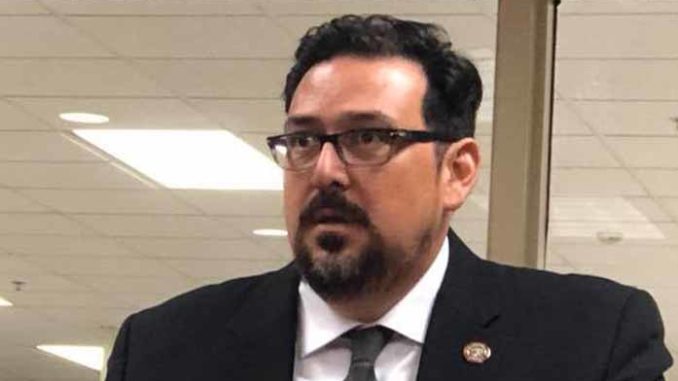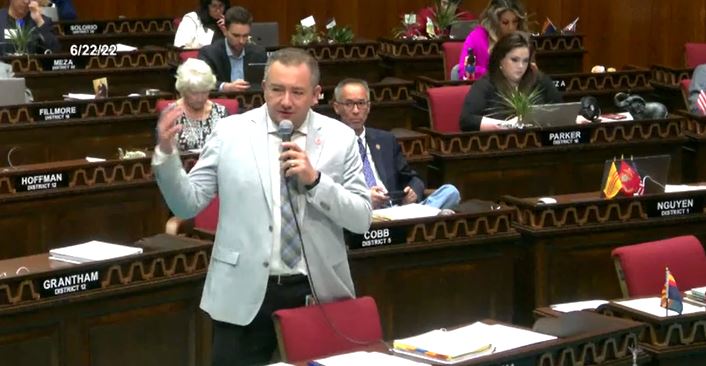
by Daniel Stefanski | Oct 23, 2023 | News
By Daniel Stefanksi |
A freshman legislator is continuing to work toward transportation improvements for an Arizona freeway.
This week, Arizona State Representative Matt Gress sent a letter to the Maricopa Association of Governments (MAG), addressing the extension of Proposition 400 and the necessity of using those allotted dollars for SR 51. He highlights the “crucial” need for Arizona’s freeways to “be among the best in the country” due to “Maricopa County being the fastest growing county in the country and Phoenix and Scottsdale among the fastest growing cities.”
In his letter, Gress notes that “SR 51 has become one of the busiest routes in the state highway system” and that “the pavement between the I-10 ministack and Shea Boulevard is well past its expected life.” According to the letter, the area of freeway described by the legislator “was installed back in 2004 making (that) pavement one of the oldest in the county.”
Representative Gress writes, “In July the Legislature approved legislation to enable Maricopa County to call an election for the extension of Proposition 400 which includes $600 million for the capital rehabilitation of the region’s freeway pavement,” adding that “these funds must be used to ensure our freeways are kept in the best conditions for the people that use them every day to go to work, transport goods, and recreate in our state.”
The lawmaker expressed his hope that MAG expediently takes care of these issues, stating, “I want to ensure your commitment to utilizing these funds to rehabilitate SR 51 in the first phase of MAG’s plan consistent with Proposition 400 monies if approved by the voters.”
Arizona legislators and the state’s governor reached an agreement on Prop 400 at the end of their marathon session in July. After the passage of the proposal out of his chamber, Senate President Warren Petersen said, “The guardrails, taxpayer protections and funding allocations in the text of this bill reflect the priorities of voters, to reinvest their tax dollars in the transportation modes they use most.” Governor Hobbs added, “Today, bipartisan leaders invested in the future of Arizona families, businesses, and communities.”
Daniel Stefanski is a reporter for AZ Free News. You can send him news tips using this link.

by Daniel Stefanski | Oct 22, 2023 | News
By Daniel Stefanski |
Arizona Legislative Republicans aren’t finished with the City of Phoenix’s action to donate firearms to Ukraine.
Last week, three Arizona State Representatives sent a letter to Maricopa County Attorney Rachel Mitchell, calling on the prosecutor to “immediately undertake a criminal and civil investigation of City of Phoenix Mayor Kate Gallego and City Councilmembers for their intentional and flagrant violation of state law in connection with their actions surrounding the City’s Ordinance S-50010.”
The letter from Representatives Travis Grantham, Quang Nguyen, and Selina Bliss, follows a response from Arizona Attorney General Kris Mayes regarding a 1487 complaint for “a recently passed City of Phoenix ordinance allowing the illegal donation of 599 unclaimed firearms to Ukraine’s national police force.” Mayes’ report found that “Arizona law requires cities to dispose of unclaimed firearms by selling them in the manner provided by statute, yet the Ordinance provides for Phoenix to dispose of its unclaimed firearms by donating them to Ukraine via an export company. Because a ‘donation’ is not a ‘sale’ – and because the Ordinance conflicts with A.R.S. 12-945 in other related respects – it violates that statute, and therefore also violates A.R.S. 13-3108(A) and A.R.S. 12-943.”
Attorney General Mayes’ findings forced the City of Phoenix to repeal the Ordinance, as the lawmakers admitted in their letter to Mitchell. However, the legislators noted some “alarming details” contained in Mayes’ report “that confirm the City Council’s lawlessness and egregious disregard for state law.” One of those details was that when faced with the threat of the Attorney General’s investigation, the City’s counsel disclosed that the City has already completed the firearms transfer contemplated by the Ordinance and the Agreement.
The three state lawmakers argue that “neither the AG’s Report nor the City’s repeal of its Ordinance absolves the City Mayor or Councilmembers of criminal or civil liability for their misconduct,” hoping that the County Attorney could determine “the extent to which the City’s elected officials conspired to: (1) knowingly and repeatedly violate state law – particularly after we alerted them to the illegality of their conduct; (2) conceal their conduct; and (3) interfere with, coerce, or thwart the Attorney General’s S.B. 1487 investigation through improper means or communications.”
At the end of the letter, the legislators wrote, “In a free society, it is critical that our elected officials follow the rule of law, even when they may disagree with the underlying policy of the law. Citizens in our state are held to this standard every day. Arizonans reasonably expect – and the law demands – that government leaders likewise comply with state law or risk serious consequences for their intentional disregard of the law.” They added their collective hope that “the Mayor and City Councilmembers must also be held fully accountable for facilitating crimes of others through their illegal transfer of weapons, including but not limited to domestic civil offenses, war crimes, and organized crimes defined in Chapter 23 of Title 13.”
Daniel Stefanski is a reporter for AZ Free News. You can send him news tips using this link.

by Daniel Stefanski | Oct 22, 2023 | News
By Daniel Stefanski |
A high-ranking Border Patrol official is sounding the alarm about the number of ‘gotaways’ in the month of October.
This week, U.S. Border Patrol Chief Jason Owens posted on “X” that “over 18,000 gotaways” have been known to have escaped detection from law enforcement “in the first 16 days of Fiscal Year 2024.”
Chief Owens added that “these are individuals whose identities and purpose we do not know.”
The 2024 fiscal year just began this month of October. Ali Bradley, a National Correspondent for NewsNation, reported that there were “roughly 670,000 ‘gotaways’ for Fiscal Year 2023.”
During President Joe Biden’s three-year (and counting) tenure in the White House, there have been more than 1.7 million estimated ‘gotaways’ at the border, compared to just over 415,000 ‘gotaways’ for former President Donald J. Trump’s four years in office. Border officials and experts have varied theories and opinions on how to estimate groups of ‘gotaways’ – especially since some are known to cover their tracks, which are key to Border Patrol’s approximations in the field. The actual number of ‘gotaways’ could be much higher than the reports.
‘Gotaways’ could pose a serious danger to the homeland of America because, as Chief Owens stated, their identities and purpose for migrating to the United States are unknown. However, these ‘gotaways’ aren’t the only concern for border officials and local law enforcement.
With the rising tensions and violence in the Middle East this month, more attention has been given to the apprehensions of aliens crossing America’s border illegally from ‘special interest countries,’ which, according to a definition from the Department of Homeland Security, is “a non-U.S. person, who, based on an analysis of travel patterns, potentially poses a national security risk to the United States or its interests.” Bradley also reported this week that there were more than 76,000 migrants from ‘special interest countries’ arriving in the United States during the just-completed fiscal year.
Apprehensions of suspected terrorists have also created major fears for law enforcement and elected officials alike, who have seen those numbers drastically increase over the past few years. In the first eleven months of Fiscal Year 2023, officials encountered 151 individuals between ports of entry, who were flagged on the Terrorist Screening Dataset, compared to 98 in FY 2022 and 15 in FY 2021.
The counts of ‘gotaways’ and apprehensions of suspected terrorists and migrants from ‘special interest countries’ aside, the situation at the border has continued to spiral out of control on all fronts. Official numbers from the month of September have not been released as of Friday afternoon, but earlier this month, Fox News reported over 260,000 apprehensions for that month. If those numbers are accurate, which they usually are, that would put the number of apprehensions at the Southwest border for FY 2023 at just under 2,500,000 – an increase over FY 2022, which was a significant jump from FY 2021.
In Chief Owens’ communication about the number of ‘gotaways,’ he also writes, “That is why you need every Border Patrol agent to be in the field and on patrol” – something that the beleaguered and overwhelmed agency hasn’t been able to institute for the better part of the past decade with the exponential rise of illegal immigration across the U.S.-Mexico border.
Daniel Stefanski is a reporter for AZ Free News. You can send him news tips using this link.

by Corinne Murdock | Oct 21, 2023 | News
By Corinne Murdock |
Arizona Secretary of State Adrian Fontes is facing a lawsuit over the use of unstaffed drop boxes to collect mail-in ballots.
Arizona Free Enterprise Club (AFEC) filed the lawsuit on Tuesday in the Yavapai County Superior Court.
AFEC argued that Arizona law requires drop boxes for mail-in ballots — or, early voted ballots — must be located at polling places and monitored by election workers. Based on that reading of statute, AFEC declared that the current Election Procedures Manual (EPM), enacted in 2019 by the former secretary of state and now-Gov. Katie Hobbs, and Fontes’ draft EPM unlawfully allowed unstaffed drop boxes.
“With no basis in statute, and supported by nothing more than executive fiat, the Secretary has authorized election officials throughout the state to employ unstaffed drop-boxes as another manner by which voters may cast their votes early,” said AFEC.
AFEC noted that the EPM provisions on the drop boxes contained zero citations to Arizona law, although the EPM issued over 1,000 citations across its pages elsewhere. AFEC said the omission was purposeful.
“The EPM’s omission of citations to Arizona’s statutes was surely not an oversight. When a statute supports an EPM regulation, the EPM cites it,” said AFEC. “Apparently, though, the EPM’s authors could find no enabling statute supporting unstaffed drop-boxes.”
Since the EPM doesn’t require these unstaffed drop boxes to be located at or near an election official’s building, they have been established at locations like churches, elementary schools, restaurants, humane societies, libraries, fire departments, and community centers. It also doesn’t place any restraints on the number or geographic distribution of the drop boxes per county.
According to AFEC, state law only allows two destinations and two entities for ballot submissions: the office of a designated election official, usually the county recorder, or a polling place, and a federal postal worker or voter’s designated agent. AFEC said that unstaffed drop boxes were therefore an impermissible intermediary in the chain of custody.
Unlike U.S. Postal Service (USPS) mail collection boxes, unstaffed drop boxes don’t have federal legal protections that impart prison sentences for crimes such as obstruction of mail passage, destruction of mail, and vandalism of a mailbox. Unstaffed drop boxes also don’t enjoy a specialized law enforcement division dedicated to investigating postal crimes, like the USPS.
Additionally, unstaffed drop boxes aren’t required to have locks: they may be secured with a “tamper-evident seal.”
Unlike the USPS, which requires the swearing-in of mail carriers, any individual designated by election officials as a “ballot retriever” may transport the contents of unstaffed drop boxes. Also, drop box contents aren’t scanned, counted, or entered into a record of sorts like their USPS counterparts.
AFEC also argued that USPS mailboxes offer an additional level of security through the untold diversity of their contents, whereas election drop boxes are clearly known to contain only ballots and theoretically become susceptible to bad actors.
“A USPS mailbox is further likely to contain different varieties of mail at any given time. From the outside, it is impossible to determine whether a particular mailbox contains early voted ballots,” said AFEC. “By contrast, an unstaffed drop-box contains only completed ballots. From the outside, one can know with certainty that the contents of a ballot drop-box are completed ballots, likely a significant number of them.”
Additionally, AFEC claimed that unstaffed drop boxes increased the likelihood of voter intimidation by independent actors seeking to prevent illegal ballot submissions.
AFEC President Scott Mussi said in a statement that unstaffed drop boxes jeopardize the safety and security of elections.
“Our lawsuit contends that state statute limits the use of drop boxes to locations that are monitored by election workers, which can include existing polling locations and the county elections office. Despite this limitation, election officials and the existing election procedure manual are ignoring statute and have been setting up unmanned drop boxes all throughout the state,” said Mussi. “We believe the use of drop boxes must be in accordance with state law, and we are hopeful that our lawsuit will result in election officials ending their use at illegal locations for the 2024 election.”
An expansive interpretation of state law concerning elections wouldn’t be an unusual trait of the Hobbs EPM. In September, the Yavapai County Superior Court ruled that Fontes was perpetuating an incorrect interpretation of “registration record.” AFEC also sued in that case.
Fontes had argued that the term “registration record” in voter signature verification law meant that other documents in a voter’s record besides the registration form could be used to verify signatures. The court invalidated the expansive interpretation of the term, thereby invalidating the corresponding portion of the Hobbs EPM.
Corinne Murdock is a reporter for AZ Free News. Follow her latest on Twitter, or email tips to corinne@azfreenews.com.

by Daniel Stefanski | Oct 21, 2023 | Education, News
By Daniel Stefanski |
Arizona’s Republican legislative leaders continue to come to the unwavering aid of the state’s Empowerment Scholarship Account (ESA) Program.
After the ESA program sustained another political attack from Democrat Governor Katie Hobbs, House Speaker Ben Toma released a statement in support of the landmark school choice expansion for the state. Toma said, “Governor Hobbs continues to blast the ESA program as unsustainable and exceeding estimates. Neither are true. We remind the Governor that she leads the entire state of Arizona, and if she seeks changes to the ESA program, she ought to propose serious policies, not tweet vague threats. The State Legislature has yet to see any policy proposals from her office. Arizona will continue to responsibly fund students, not systems.”
According to the Speaker’s press release, “the Department of Education reported on October 4 that the budget is currently on pace to have a year-end surplus of roughly $77 million,” adding that “the budget estimate of 68,000 total users (in the ESA program) is within 1% of the current program enrollment.”
The Speaker’s defense of ESAs came soon after Hobbs unleashed another attack against it, claiming that the program “threatens to decimate our state’s budget.” In a post on the platform “X,” Governor Hobbs stated, “The school voucher program is unaccountable and unsustainable. It does not save taxpayers money, and it does not provide a better education for Arizona students…I call on Superintendent Horne, Speaker Toma, and President Petersen to join with bipartisan leaders to pass accountability and transparency measures, and bring an end to this wasteful, runaway spending.”
Horne and Petersen also took time to respond to the governor’s assertions, pushing back against her allegations and supporting the integrity of the program. Horne said, “The Governor’s calculation is in error. She is counting the $7,200 paid for each ESA student without offsetting the $13,000 paid per student that would otherwise be spent for that student to attend a public school. The overall numbers bear this out as the expenditures for all public-school spending, including the ESA program are $72 million below budget.”
Petersen added, “Arizona families want choices for their children’s education. ESAs are one of many choices the Legislature is prioritizing. The fact is, we budgeted for the 68,000 kids currently enrolled and have responsibly planned for incremental spending increases for this program in the years to come, as we do with a variety of other programs in our overall budget. We’re always open to improving our state’s programs, but for the sake of Arizona families who want to choose the best educational settings to meet their children’s needs, ESAs are here to stay.”
Since failing to address ESA changes in the state’s budget, which was passed earlier this year, Governor Hobbs has increased her political volleys against the program, joining allies who were enraged at her perceived capitulation to Republican lawmakers. As a new legislative session nears, Hobbs and her staff will likely be more focused on exacting some concessions when the next round of budget negotiations resume in 2024. Ultimately, Arizona voters will have a significant role in determining the direction of the state’s ESA program, whether by changes to the political party make-up of the legislature or through a yet-to-be-filed ballot initiative.
Daniel Stefanski is a reporter for AZ Free News. You can send him news tips using this link.

by Corinne Murdock | Oct 20, 2023 | News
By Corinne Murdock |
The Arizona Corporation Commission (ACC) is refusing to ban the implementation of Environmental, Social, and Governance (ESG) policies in monopoly utilities operating in the state, claiming that they lack the authority to do so.
The ACC issued its declaration in response to several letters petitioning a prohibition against ESG implementation by utilities under its purview. Two of those letters came from the Arizona Free Enterprise Club (AFEC), and one came from former ACC commissioner Justin Olson.
In AFEC’s first letter, issued in late August, AFEC President Scot Mussi made the case that ESG goals and initiatives would result in unreliable services and increased costs for ratepayers. The Arizona Constitution requires the ACC to ensure utilities have “just and reasonable rates” as well as practices that result in the “convenience, comfort, and safety, and the preservation of the health” of users.
“The truth is that a forced ‘transition’ to these resources, as required by ESG, would cost ratepayers $6 billion,” stated Mussi. “This fact alone should require the Commission to prohibit it, as this body is constitutionally obligated to ensure just and reasonable rates.”
In 2021, the ACC rejected a proposed mandate for utilities to generate their resources entirely from renewables such as wind and solar following an independent study estimating the cost to ratepayers at $6 billion. Even without the ACC mandate, the state’s utilities have committed to realizing Net Zero by 2050: a goal to eliminate all carbon emissions by 2050 by transitioning entirely to renewables.
In addition to the Environmental aspect of ESG, Mussi contended that the Social and Governance policies enacted by the monopoly utilities would impact the affordability and reliability of their services. Specifically, Mussi expressed concerns with the unforetold consequences of utilities’ deprioritization of merit and cost in decision-making and prioritization of diversity, equity, and inclusion (DEI) in contracts, corporate structure, board leadership, and hiring.
“Just as corporations have a fiduciary duty to their investors and stakeholders, so too do utilities have a duty to ratepayers to provide cost effective and reliable energy. That is the lens through which RFPs should be evaluated, not ideological commitments such as DEI,” stated Mussi. “[T]his potentially unconstitutional discrimination in the workforce could subject them to litigation, the costs for which utilities will try to recover from ratepayers in subsequent rate cases.”
With no response given to the first letter, AFEC issued a follow-up letter earlier this month. Mussi reiterated that utility resource portfolios based primarily on ESG goals rather than affordability and reliability triggered ACC’s regulatory authority. Mussi claimed that ESG bans wouldn’t impair utilities’ ability to obtain investments, arguing that lenders prefer the reliability of grids based on gas and oil rather than renewables. He cited famed venture capitalist Kevin O’Leary, best known for his role on the “Shark Tank” reality show.
“The Commission should not allow foreign banks and investors to hold Arizona’s ratepayers hostage, undermining our energy independence which threatens our state’s security,” said Mussi. “[W]ell-known investors are willing to spend $14 billion to open a new oil refinery, despite the growing ‘green’ political agenda […] because ultimately it makes good policy sense and it makes good financial sense.”
Former commissioner Olson’s letter echoed those sentiments, and noted that the ACC had set a regulatory precedent by prohibiting COVID-19 vaccine mandates for utility employees.
“The Commission’s constitutional obligation is to protect ratepayers by ensuring just and reasonable rates, but the adoption of ESG is incompatible with this requirement,” said Olson. “If the Commission does not proactively prohibit the utilities from pursuing these initiatives, utilities will continue to come back to recover the costs associated with them. It will impact resource planning, every future rate case, and the reliability of our power grid.”
Yet, in the ACC response letter issued Tuesday, Commissioner Nick Myers said that the ACC couldn’t regulate the internal affairs of parent companies from which the public service corporations receive their ESG goals and initiatives. Myers agreed that clean energy mandates resulting in higher rates and unreliability of services were problematic.
“Generally, the Commission has the authority to control rates but not the authority to control the utility itself, particularly its internal affairs,” said Myers. “This is especially the case when regulated utilities implement goals and initiatives handed down from parent companies, which are not public service corporations and which the Commission does not regulate. That being said, I agree that clean energy mandates or self-imposed clean energy goals that unreasonably drive up rates for customers or jeopardize reliability are problematic.”
Myers noted in his letter that the ACC could only address ESG policy impact on rates and reliability through the Integrated Resource Plan (IRP) process. The IRP process allows parties to intervene and introduce evidence proposing the implementation or discontinuation of utility programs, especially those impacting rates and reliability. Myers encouraged AFEC to intervene in future rate cases by engaging in the IRP process.
“The IRP process and rate cases are therefore the best venues to address utility goals and initiatives that may be driving up costs for ratepayers and jeopardizing safe and reliable service,” said Myers.
Myers declined to address the social and governance issues presented by AFEC, declaring that these were outside of ACC purview.
AFEC President Scott Mussi replied to Myers in a response letter on Thursday. He noted that AFEC has been involved in the IRP process, which he contended was “controlled by the utilities” and lacking the ability to counter ESG impact.
“[U]nless ESG is prohibited by the Commission upstream, every downstream policy and ratemaking decision at the Commission will be shaped by it,” said Mussi. “The failure with [Myers’] approach is that it guarantees that all future resource plans will be ESG resource plans and all future rate hikes will be ESG rate hikes.”
Corinne Murdock is a reporter for AZ Free News. Follow her latest on Twitter, or email tips to corinne@azfreenews.com.






